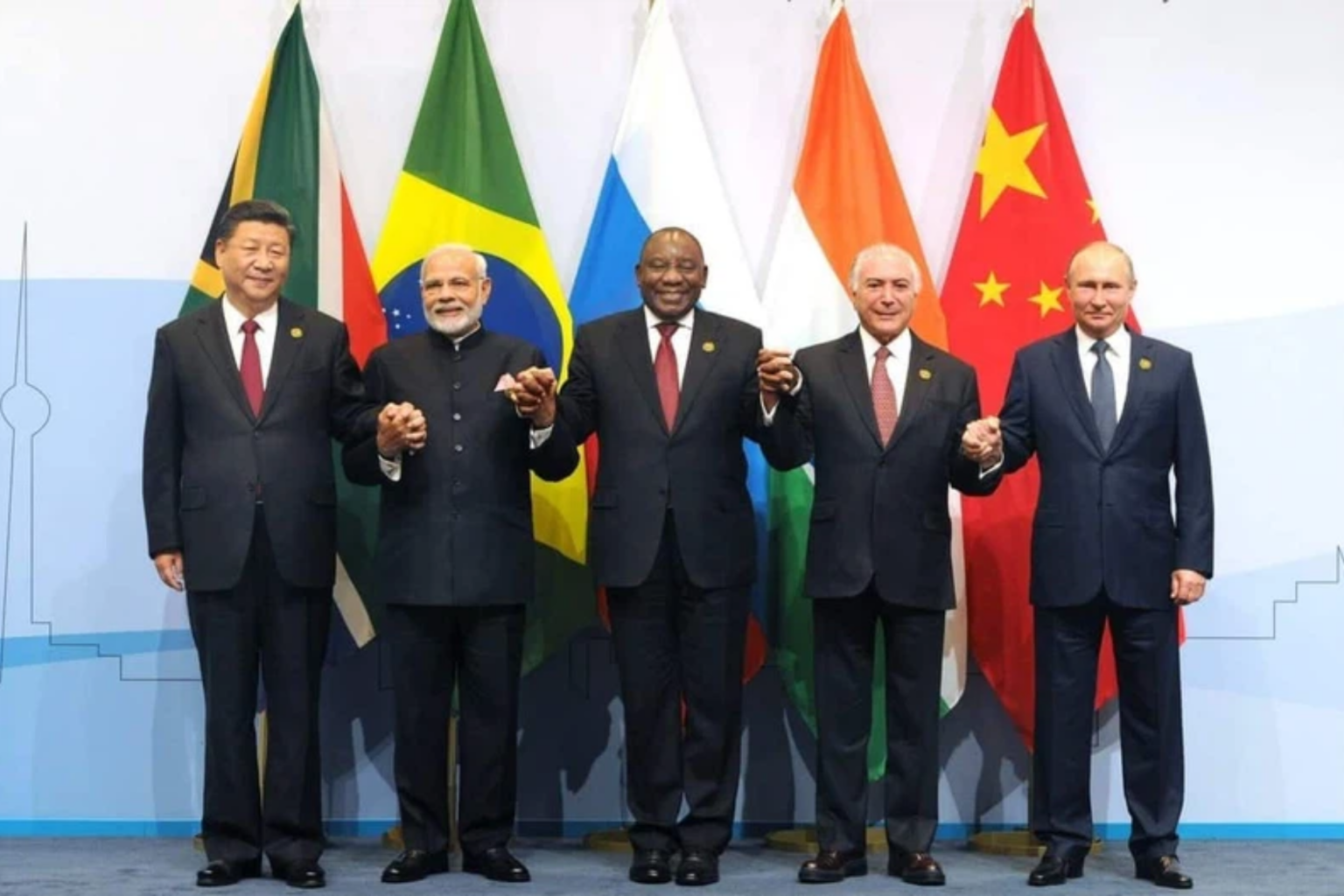- Heads of State from China, Brazil, and India, except Russia will attend the 15th BRICS summit in Johannesburg South Africa, starting August 22.
- President Vladimir Putin will participate in the summit virtually but will be represented in Johannesburg by Foreign Minister Sergei Lavrov.
- The bloc is also expected to discuss how to boost local currency fundraising and lending within the New Development Bank.
The five nations, Brazil, Russia, India, China and South Africa (BRICS) are now a band of economies showcasing their ambition to maximize their emerging economies potential, across geopolitics axis. In one day time, heads of state from China, Brazil, and India, (except Russia) will attend the 15th BRICS summit in Johannesburg South Africa from August 22-24.
South African President Cyril Ramaphosa, Chinese President Xi Jinping, Brazil’s President Luiz Inacio Lula da Silva and Indian Prime Minister Narendra Modi are expected to discuss a number of items as few details have emerged about what they plan to discuss.
However, Putin will participate in the summit virtually and will be represented in Johannesburg by Foreign Minister Sergei Lavrov. Meanwhile, President Jinping will execute his state visit in South Africa simultaneously in the same week.
BRICS challenging status quo
Over the years, BRICS has been aiming at dwarfing the long-standing influence of the Bretton Woods Institutions, the World Bank and the International Monetary Fund (IMF)).
Accounting for a quarter of the global economy and 42 percent of the world population, the world is watching how BRICS stand to challenge the status quo.
According to South Africa at least 40 countries including Saudi Arabia, Iran, United Arab Emirates, Argentina, Indonesia, Egypt and Ethiopia, have expressed interest in joining BRICS.
Also a total of 69 countries have been invited to the summit in South Africa, including all African states, and expansion is expected to be high on the agenda.
The term BRIC was first coined by a Goldman Sachs economist to describe the rise of Brazil, Russia, India and China in 2001. Those countries had their first summit in 2009 in Russia, and when South Africa joined the following year, the group became known as BRICS.
Thus, does this mean the bloc holds enough thread to weave a strong challenger against the west. Meanwhile, there are underlying issues facing the BRICS that might make or break it.
China which reinforces expansion of BRICS seeks to extend its influence is battling United States over trade and geopolitics, meanwhile Brazil is sceptical—an inevitable matter of discussion in the upcoming summit.
Underlying BRICS challenges
The term safety in numbers seems to be alien to Brazil and India, as the two economies resisted adding more member countries, according to information from Reuters.
On the other hand, Russia another country with good intentions but handful, is dealing with global diplomatic isolation over the Ukraine war, is onboard with welcoming more members as South Africa.
Further down the line, Brazil is concerned the group will lose stature if other nations are let in. Some 30 countries have said they are interested and 22 of them have formally applied, as Algeria did last month.
Meanwhile, the China’s foreign ministry said in a statement that Beijing “ Support progress in expanding membership and welcomes more like minded partners to join the BRICS family at ab early date”.
The Kremlin spokesman Dmitry Peskov told news briefing that, “this is a very important topic because we see more and more countries are making statements about their intention of joining BRICS”.
Also Read: South Africa in diplomatic bind on Putin’s BRICS Summit attendance
Challenge western influence
As BRICS workout its internal affairs, the vitality of the summit and its agenda are not to be ignored. Forging a complete functioning bloc that could challenge the western influence seem to tricky for BRICS and a necessary process for the bloc to emerge strong and realistic.
Issues such as influence are at the core of BRICS power pay as more countries request admission. Having Indonesia – a strong BRIC candidate with regional power, growing role in global economy could slimmer India and Brazil influence over time.
With the agenda of standing out of the western economic domination in global affairs, BRICS is the new dawn of offering opportunities for emerging economies.
BRICS brings out opportunities to the table that could transform emerging economies such as Ethiopia ambitious to join, despite having relatively small economy compared to BRICS members.
The matter of economic cooperation and increasing multilateral trade and development is essential for BRICS same as the nature of execution. As the latter begs for an alternative execution to global bodies who have been dominating global economies.
Common currency among BRICS
The bloc is also expected to discuss how to boost local currency fundraising and lending within the New Development Bank (NDB), and potential financier to champion development.
However, according to South Africa’s Finance Minister Enoch Godongwana, local currency use will help de-risk the impact of foreign exchange fluctuations.
“The dollar has gained against emerging market currencies since Russia invaded Ukraine and the Federal Reserve began raising interest rates to fight inflation in early 2022, making dollar debt more costly for those countries to service,” Reuters stated.
The NDB, which was established in 2015, is still looking at the potential use of alternative currencies. Despite being compelling enough to understand the depth of common currency among BRICS, South Africa’s senior BRICS diplomat said that there will be no talk about a common BRICS currency during the summit.
